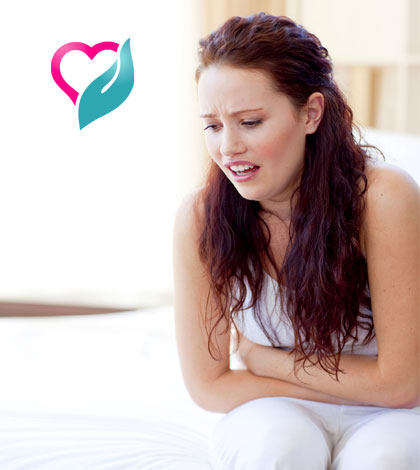One of the major causes of absenteeism from work , decreasing efficiency and quality of life amongst women is Dysmenorrhoea , also called Menstrual cramps .
[wp_ad_camp_1]
The word Dysmenorrhoea is derived from Greek word : Dys – difficulty , Menorrhoea – monthly flow . Thus it is defined as pain associated with menstruation . It is the commonest gynecological disorder affecting women in reproductive age group .
In Ayurveda , the diseases in women are described under ‘ Yonivyapad ’ where Yoni means genital organs and Vyapad means diseases . One of them having similarity with dysmenorrhoea is Udavartini Yonivyapad . The cause of painful menstruation is Vata . The pain is before onset of menses which is relieved with start of menses .
[wp_ad_camp_4]
Classification of Dysmenorrhoea :
a) Primary or Spasmodic : It is the painful menstruation in the absence of pelvic pathology . It is essentially a first day pain .
b) Secondary or Congestive : It is the painful menstruation secondary to underlying organic disease of the pelvic organs . Pain may continue throughout flow .
Risk Factors :
a) Menstrual Factors : Early menarche ; long and heavy menstrual cycles .
b) Cigarette smoking
c) Behaviourial & Psychological Factors :
- Just before and during menstruation , most women are less efficient physically and more unstable emotionally – these factors lower the pain threshold .
- Expectation of pain can be fostered by overanxious parents and by curtailment of normal physical activities during menses .
- Unhappiness at home or work .
d) Uterine hyperactivity and incoordinate muscle action of the uterus .
e) Hormonal Imbalance : It has been observed that progesterone induces high tone to the uterus .
f) Prostaglandins : They increase the sensitivity of the nerve endings to pain .
Sign & Symptoms :
Primary Dysmenorrhoea :
- Pain is experienced a few hours before and after the onset of menstruation and rarely lasts for longer than 12 hours .
- It is colicky in type and causes her to double up .
- Pain is felt in lower abdomen , inner and front aspects of the thighs .
- Some low backache may be present .
- During severe attack , woman looks drawn , pale and may sweat . Nausea , vomiting are common . There may be diarrhea and rectal and bladder tenesmus .
- In 50 % of cases the pain does not arise until 6 – 12 months after menarche.
Secondary Dysmenorrhoea:
- It usually develops after a phase of painless menstrual cycles and is seen at older age .
- Pain is worst premenstrually and relieved during menses .
- It is diffuse , dull ache in the pelvis often accompanied by backache .
- Most common causes are Pelvic inflammatory disease ( PID ) , endometriosis , IUCD etc .
Management :
a) General Measures :
- Counselling : Explaining young girls regarding the condition and reassurance should be an essential component in the treatment plan . Girls should be taught to have a proper outlook on menstruation and health in general .
- Improvement in nutritional status and dietary changes .
b) Physical Activity : It can be in the form of yoga , walk , exercise , aerobics etc . The yogasanas which are helpful in dysmenorrhoea are pavanmuktasana , bhujangasana , paschimottanasana , katichakrasana , Pranayam etc .
c) Diet :
- Do’s : whole grains – wheat , rice , oats , millets , quinoa ; fruits , green leafy vegetables , legumes , nuts , seeds – sesame , pumpkin , flax ; spices – ginger , garlic , cumin , turmeric , ajwain etc .
- Dont’s : Cold , salty , sour , junk food , meats , processed food , soft drinks , alcohol.
d) Home Remedies :
- Triphala powder 1 tsp with lukewarm water at night should be taken 4 – 5 days prior to menstruation .
- Ajwain , jeera , sowa – taken in equal quantity and powdered . Take 1 tsp twice a day with lukewarm water .
- 20 ml decoction of black sesamum seeds with 500 mg dried ginger powder can be taken .
- Aloe vera juice with turmeric powder is helpful .
e) Ayurveda :
- Oral Medicines : Rajahpravartini vati , Dhanwantaram gulika , Triphala guggulu , Yograj guggulu , Dashmularishta , Manjishthadi kwath , Kumaryasava , Hingvashtaka churna etc can be taken under supervision .
- Panchakarma : Basti or medicated enemas are very helpful in Dysmenorrhoea .
Dysmenorrhoea , though is a cause of distress but with awareness and proper management it can be relieved . And thus no more of those painful days .
[sws_green_box box_size=”600″]Article by,
Baljot Bharaj
www.kayakalpayurveda.in , bhbharaj@gmail.com , Mobile : +91-9915906929 [/sws_green_box]
[wp_ad_camp_3]
Image courtesy : drchoprashomeopathy.com





















